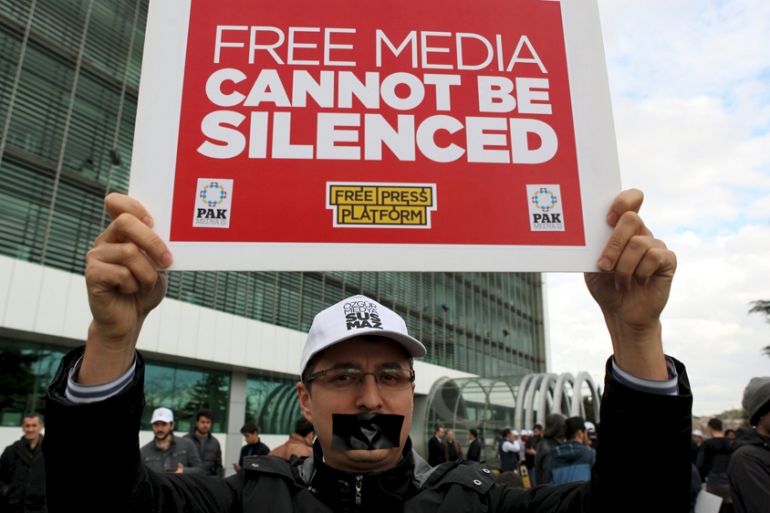Another dark moment for the Turkish media
In an increasingly volatile Turkey, the takeover of Zaman marks the latest blow in the battle between Erdogan and Gulen.

How fast the tide turns in Turkey.
Just over a week ago, journalists and free speech advocates here celebrated the release from jail of Can Dundar and Erdem Gul, the editor-in-chief and Ankara bureau chief, respectively, of the daily newspaper Cumhuriyet.
Keep reading
list of 4 itemsIsrael’s war on Gaza: Rights groups urge Biden to oppose threats to ICC
Vietnam’s security chief To Lam becomes new president
‘Nowhere to go’: Rohingya face arson attacks in Myanmar’s Rakhine State
Turkey’s Constitutional Court had ruled that their arrest had violated their rights as journalists. Many believed the decision would start to roll back a government crackdown on critical media that had expanded significantly in recent months. “I think this is a very historic decision,” Dundar said upon his release, adding that he was happy “there were still judges in Turkey”.
Some judges giveth; some taketh away. On March 4, a Turkish court approved a government takeover of Feza Media Group that oversees Zaman, Turkey’s most widely circulated newspaper, Cihan, a leading news agency, and Today’s Zaman, an English-language daily with international reach.
The takeover marks this government’s biggest blow against media freedom, and yet another gut-punch in the long-running and deeply personal slugfest between President Recep Tayyip Erdogan and Fethullah Gulen.
An aging Islamic leader from Turkey living in self-imposed exile in rural Pennsylvania, Gulen oversees a vast, loosely affiliated organisation that runs thousands of schools, businesses, and media outlets around the world and had in recent decades placed many of its members in key positions in Turkey’s police and judiciary.
Personal vendetta
The long and winding history of Erdogan and Gulen has been recounted elsewhere. Suffice it to say that the two are now a bit like Magneto and Professor Xavier of the X-Men films: terribly powerful allies-turned-arch-enemies, dealing body blows from above the fray as their underlings (read: Turkey’s various institutions) sustain the damage.
Their falling out exploded into public view in December 2013, when Gulenists in the police and judiciary launched a vast corruption probe that implicated many top officials in the Justice and Development Party (AKP) government.
The takeover of Zaman seems less a sign that Turkey's government has little respect for media freedom - this had long been established - than yet more evidence that Erdogan will do anything he can to drive a stake into Gulen and his meddling 'parallel structure'.
In response, Erdogan swore vengeance on the vast “parallel structure” that he believes seeks to topple the state. “We will go after them in their lairs,” he said after an election triumph in March 2014.
And so it has come to pass. After dismissing and reassigning tens of thousands of Gulen-linked police and justice officials, the AKP has taken aim at Gulen-linked media. Last October, the government snatched the reins of the Koza-Ipek Group, which runs the dailies Bugun and Millet and their sister TV stations.
Now comes Zaman, the jewel and centrepiece of the Gulenist media empire. It should be mentioned, however, that since the corruption scandal, Zaman had become vehemently and predictably anti-government, with nearly every story heaping criticism on Ankara.
No surprise, then, that it had long been in government crosshairs. Back in December 2014, police swarmed Zaman’s offices and detained editor-in-chief Ekrem Dumanli and 30 other journalists. They were later released. This time, the government went all the way.
By Friday evening, police had violently raided the Zaman offices and detained its managers. Christophe Deloire, secretary-general of the media advocacy group, Reporters Without Borders, called the takeover “ideological and unlawful”, adding: “Erdogan is now moving from authoritarianism to all-out despotism.”
In the days to come, most Feza journalists will likely be replaced with folks more willing to toe the government line, and Turkey will lose one of its few remaining critical voices (the transformation is moving quickly).
Unsurprising move
Why kill Zaman now? It goes back to the release of Dundar and Gul. In a recent column, Hilal Kaplan laid out the government’s perspective: Dundar revealed himself as a Gulenist insider in late 2013, when he appeared to predict the coming corruption scandal.
He then proved this affiliation, Kaplan explains, with the Cumhuriyet story about trucks dispatched by Turkey’s intelligence agency supposedly delivering weapons to jihadis (which is the article for which he and his colleague had been arrested).
OPINION: How Erdogan lost the liberals
Whether or not Dundar is Gulenist is immaterial here. What matters is that the government has seen it fit to lump him in with the nefarious coup plotters. Thus, his recent release from jail marked a victory for Gulen; Erdogan had to respond. “I do not respect this ruling,” the president said in response to the Constitutional Court’s decision. “I’m not going to abide by it.”
The takeover of Zaman seems less a sign that Turkey’s government has little respect for media freedom – this had long been established – than yet more evidence that Erdogan will do anything he can to drive a stake into Gulen and his meddling “parallel structure”.
Next up might be Cumhuriyet, or even bigger prey. In her piece, Kaplan argues that, in calling for the release of Dundar and Gul, Turkey’s highest court overstepped its bounds.
“With this ruling, the Constitutional Court proved that it is not a legal and supra-political institution, but a structure that is ready to make political decisions when necessary … a structure that is far from supervision and accountability.”
Going by his recent statements, Erdogan also sees the Constitutional Court as problematic, even unconstitutional. Perhaps it, too, is controlled by Pennsylvania and is in need of some discipline.
David Lepeska is a freelance journalist based in Istanbul. His work focuses on Turkey and the Middle East.
The views expressed in this article are the author’s own and do not necessarily reflect Al Jazeera’s editorial policy.
